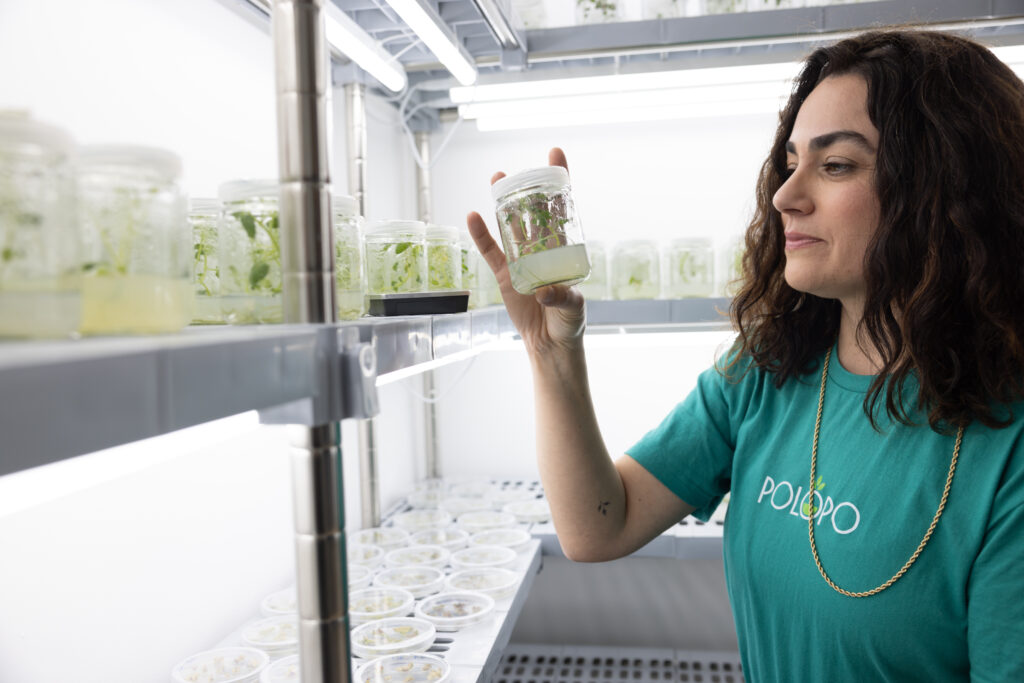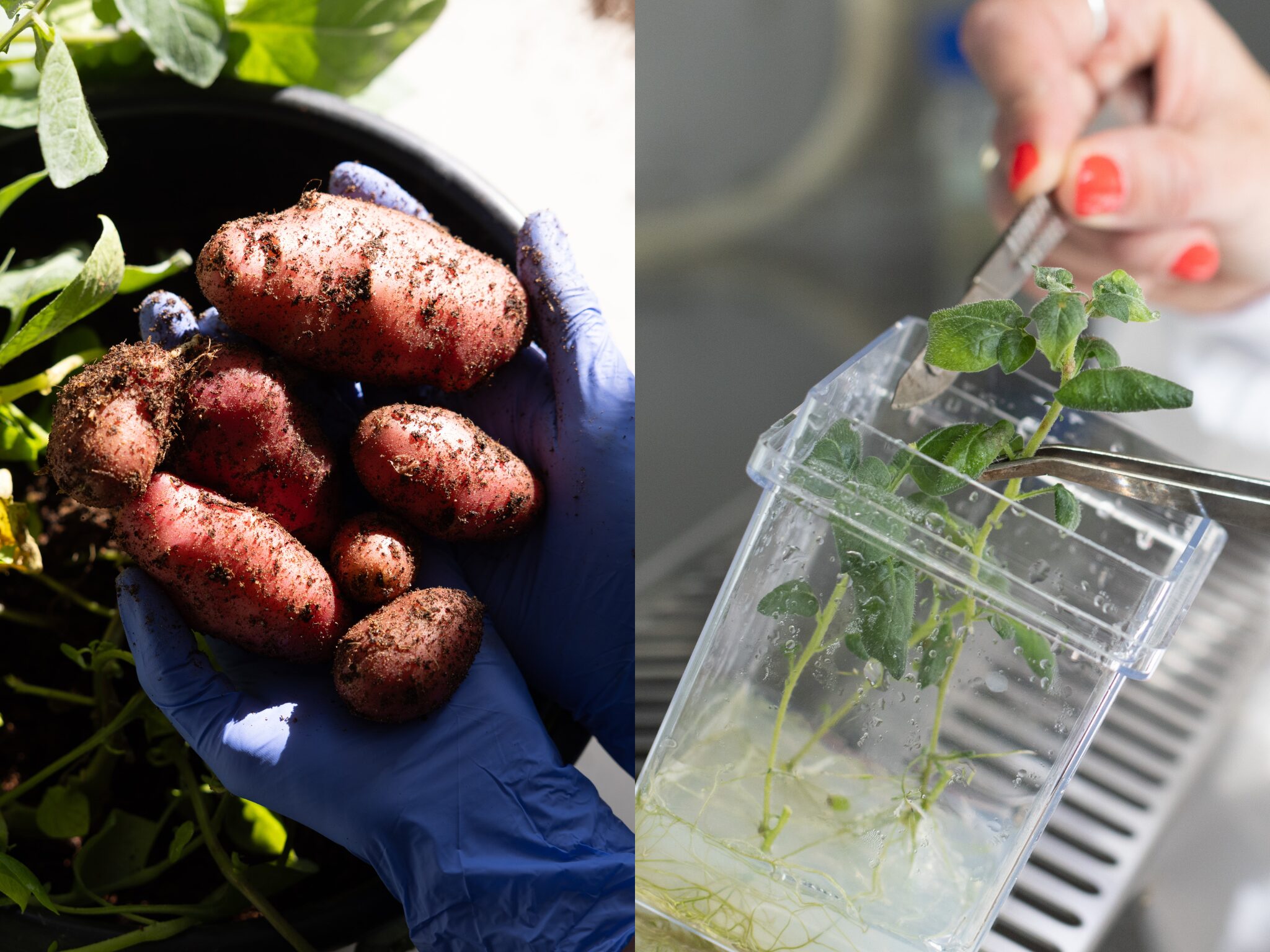SuperAA: PoLoPo’s Molecular Farming Platform Turns Potatoes Into Egg Protein Factories
4 Mins Read
As molecular farming gains steam as an alternative protein pillar, Israel’s PoLoPo joins the party with a tech platform that can transform potatoes into protein-producing factories, starting with egg proteins.
Your egg and potato hash could soon be a potato and potato hash. Emerging from stealth this week, Israeli food tech startup PoLoPo is using molecular farming technology to increase the native protein content in potatoes, and produce the main protein found in chicken eggs.
The company has unveiled its SuperAA platform, which it describes as the first step towards producing proteins from common plant crops. This is currently deployed at greenhouse scale, and is capable of generating patatin and ovalbumin via proprietary metabolic engineering techniques.
Molecular farming, which has been described by industry think tank the Good Food Institute as the fourth pillar of the alternative protein world, uses genetic engineering methods to biohack plants and produce functional ingredients and nutrients.
“The SuperAA platform uses plants as living factories, and leverages their natural productivity and storage organs to grow proteins that are identical to protein derived from a chicken’s egg,” said PoLoPo CEO Maya Sapir-Mir, who co-founded the startup with CTO Raya Liberman-Aloni in 2022.
How PoLoPo turns potatoes into egg proteins

PoLoPo’s Super AA platform grows target amino acids within a potato’s tuber, which are harvested when they reach sufficient size. The protein is then extracted and dried into a powder that can be integrated into existing food processing lines and formulations.
Essentially, the startup inserts a DNA sequence into the potato to teach it to produce an egg protein that is fully functional, nutritionally equivalent and chemically identical to chicken eggs, but without any animal input. The latter is what sets it apart from other alternative egg products. While PoLoPo’s potato-derived egg proteins are vegan, unlike its plant-based competitors on the market, they’re not suitable for people with egg allergies.
The company claims the product has undergone rigorous testing and meets all the necessary food safety standards, deeming it safe for consumption after quality control assessments.
PoLoPo began with potatoes due to their resilience in diverse climates, low growth costs, short maturation time, relatively large storage capacity (in the form of tubers), high yields, and compatibility with existing technologies. Strategically, it is an efficient and sustainable ingredient that offers attractive financial opportunities for established agrifood producers, which will allow PoLoPo to chart a cost-effective course towards scaling its Super AA system.
Patatin is a group of native proteins found in potatoes, and PoLoPo’s powdered version can be used as an allergen-free protein for a host of applications, including plant-based meat and dairy, baked goods, cereals, snacks, beverages, sports nutrition and nutraceuticals. Additionally, it can improve food security in regions hit by malnutrition.
Molecular farming on the rise

Molecular farming differs from cell cultivation and precision fermentation in that it modifies plant cells – not microbes or animal cells – so they can replicate animal proteins, which can be harvested from leaves or other plant tissues. It’s a process that occurs when microorganisms infect plants, transferring some genes in the process – scientists use similar methods to give plants new instructions to create proteins.
It offers some key advantages over other forms of alternative protein, especially in terms of cost and scalability, given that it doesn’t require bioreactors to produce ingredients – the plants themselves are the bioreactors in this case. Many companies – such as Moolec, Nobell Foods, Mozza, Miruku, Tiamat Sciences, Bright Biotech and ORF Genetics – have identified it as a viable and sustainable solution for producing planet-friendly analogues to animal products, and research suggests it’s a market that could be worth $3.5B by 2029.
“The high-scale production of proteins in plants via molecular farming has the potential to economically transform not only potato farming and processing, but broader agriculture and agtech, for a more resilient and sustainable food system,” explained Sapir-Mir, whose company closed a $2.3M pre-seed investment round last year.
PoLoPo’s proteins will soon be available to food manufacturers for testing. They will appeal to companies looking to diversify their portfolio, make their products more allergy-friendly, and remove their reliance on industrial farming – in the US alone, most (if not all) egg-laying hens are part of concentrated animal feeding operations. Plus, eggs themselves have gone through supply chain issues over the last few years, with avian flu leading to shortages and subsequent price hikes.
Ovalbumin, meanwhile, is a protein widely used in the CPG sector, given its textural and stabilisation characteristics. It also enhances nutritional value and increases the shelf life of products, and is set to hit $36B in market value by 2032.
Other companies working with egg alternatives include Just Egg (which represents 99% of all sales in the US vegan egg market), Yo Egg, Hodo, Simply Eggless, WunderEggs, Oggs, Crackd, Perfeggt, Neggst, and Neat Egg, among others, while The Every Co, Onego Bio and Formo employ precision fermentation.




